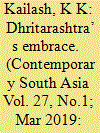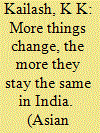| Srl | Item |
| 1 |
ID:
165248


|
|
|
|
|
| Summary/Abstract |
Why do we find more parties from Tamil Nadu in the Lok Sabha compared to Kerala and why are there more parties in the legislative assembly in Kerala compared to Tamil Nadu? This incongruence is puzzling since elections to both levels of government, federal and state, are based on the single-member simple plurality electoral system and the territorial boundaries of the state, and therefore the societal environment remains constant. This article argues that this incongruence is not merely the product of the federal parliamentary structure of the polity, electoral rules, and socio-economic factors but because of what parties do. This article gives agency to parties and brings party strategy to the centre of the analysis.
|
|
|
|
|
|
|
|
|
|
|
|
|
|
|
|
| 2 |
ID:
106452


|
|
|
|
|
| Publication |
2011.
|
| Summary/Abstract |
When political parties organize, compete and maintain interests at different levels, they bring interconnections both between as well as horizontally across levels. This study suggests that the autonomy of state politics formulation may have to pay greater attention to the federal framework and give more consideration to the role of polity-wide parties. This study uses the autonomy thesis as a heuristic tool and expands the discussion beyond state politics as considered by Yogendra Yadav-Suhas Palshikar. It examines the interface between the rise of the state as the primary unit and the functioning of political parties, especially in a multi-party competitive scenario where parties are forced to enter into coalitions. By situating India and its coalition experiences within a broader literature of comparative politics, the study tries to enrich our understanding about the relationship between federalism, political parties and coalition politics.Government
S
|
|
|
|
|
|
|
|
|
|
|
|
|
|
|
|
| 3 |
ID:
113202


|
|
|
|
|
| Publication |
2012.
|
| Summary/Abstract |
This paper examines "no opinion" and "don't know" responses in the National Election Study 2004. Comparing responses on social and political questions, it finds that the marginalized sectors of society are more likely to be socially opinionated than to express substantive political opinions. This paradox might explain why the so-called "democratic upsurge" did not produce radical political transformation in India.
|
|
|
|
|
|
|
|
|
|
|
|
|
|
|
|